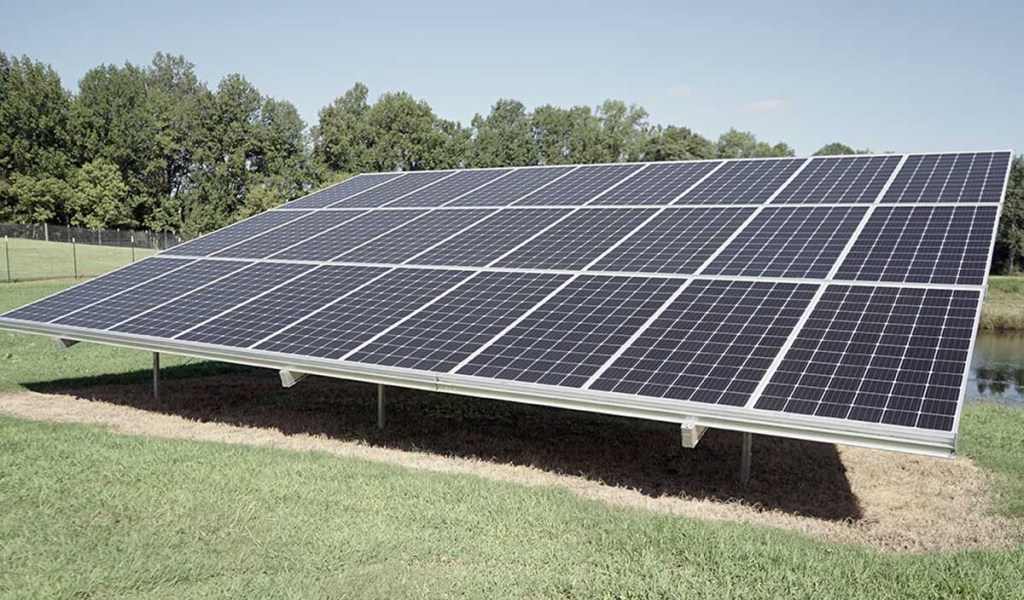Baileyton farmer Brad Mitchell uses solar energy to power his operation
Published 1:15 pm Thursday, October 20, 2022

- This panel transfers energy collected from the sunlight at Mitchell’s farm into the electricity used to power his wood shop, as well as water pumps, fencing, and lighting.
With the explosion of backyard hobby farms, small, personal gardens have been springing up in all shapes and sizes.
Some of those are hardly more than a planter filled with herbs placed quaintly outside of a windowsill, others may have planted enough vegetables to feed their family, but there might even be a chicken coop with several hens that provide eggs.
Trending
But one crucial ingredient to any of these gardens though is sunlight. Cullman County Master Gardener Brad Mitchell’s farm in Baileyton relies on the sun just like any other hobby farm, but unlike other gardens, the same sunlight that feeds Mitchell’s plants also feeds a 25 kilowatt solar system used to power the property.
After spending nearly 26 years working in the commercial nuclear power industry at Brown’s Ferry, and another 14 years in nuclear power facilities across the world, Mitchell became quite familiar with the idea that one means of receiving electricity simply is not enough.
“With nuclear power you have to have backups for the backups for the backups,” Mitchell said. It was with this same mindset that Mitchell looked to solar energy as a means to power the barn located in his backyard as well as his farm. Everything on his property except his house and swimming pool are primarily powered from the system.
The wood shop within the barn draws the the bulk of electricity generated from the system with its more industrial machinery, but fencing surrounding a chicken coop and Mitchell’s “fall garden,” as well as a pump that sends water to the crops through an irrigation system from Mitchell’s well, are also powered almost exclusively from the system. A separate system installed on the roof of his goat barn provides power to the lights, electric fencing and milking machine.
“We are trying to do everything we can to mitigate fertilizer costs and water cost,” Mitchell said.
And while he is still feeling the initial installation costs, Mitchell said that month-to-month energy costs for his barn service have been cut nearly in half since the system was installed almost a year ago.
Trending
Mitchell admits that this system is probably not ideal for the average farmer or gardener, and it was quite costly — Mitchell estimated his final costs to be roughly $40,000 — but realizes that this technology is only just beginning to become feasible on a consumer level and anticipates costs to fall over time.
“The first video recorder probably cost about $2,000 and it’s extinct today. Now you can just pick up your phone and use it,” he said.
For Mitchell though, the true benefit that comes with having a system such as this isn’t energy savings, but is the peace of mind that it provides him and his family. The solar panels feed into and charge a battery backup system that provides power to his main house in the event of an outage. Two additional generators such as the one used in Mitchell’s goat barn are also charged from the system and can be used to power critical appliances in the event of a prolonged outage.
“Most people don’t realize that the most fragile part of our electrical system is the grid, and smart people can pretty easily take that out if they wanted. I just wanted to have that redundancy that we can maintain that part of our lives that we have gotten used to. A lot of people think ‘Well, if something bad happens I’ll just grow a garden.’ but it really doesn’t work that way. You have got to have your soil prepared, you’ve got to have the seed, you’ve really got to have everything in place before something happens,” Mitchell said.
It’s not only Mitchell’s family that he wishes to maintain this safety net for. As a member of the Cullman Lion’s Club and Master Gardener’s Association, Mitchell actively participates in the Grow More, Give More gleaning program with the North Alabama Agriplex that collects excess produce from farmers and distributes it to local food banks. Mitchell said this year alone the program collected roughly 7,000 pounds of produce — 1,200 pounds of which came directly from Mitchell’s backyard solar powered garden.





